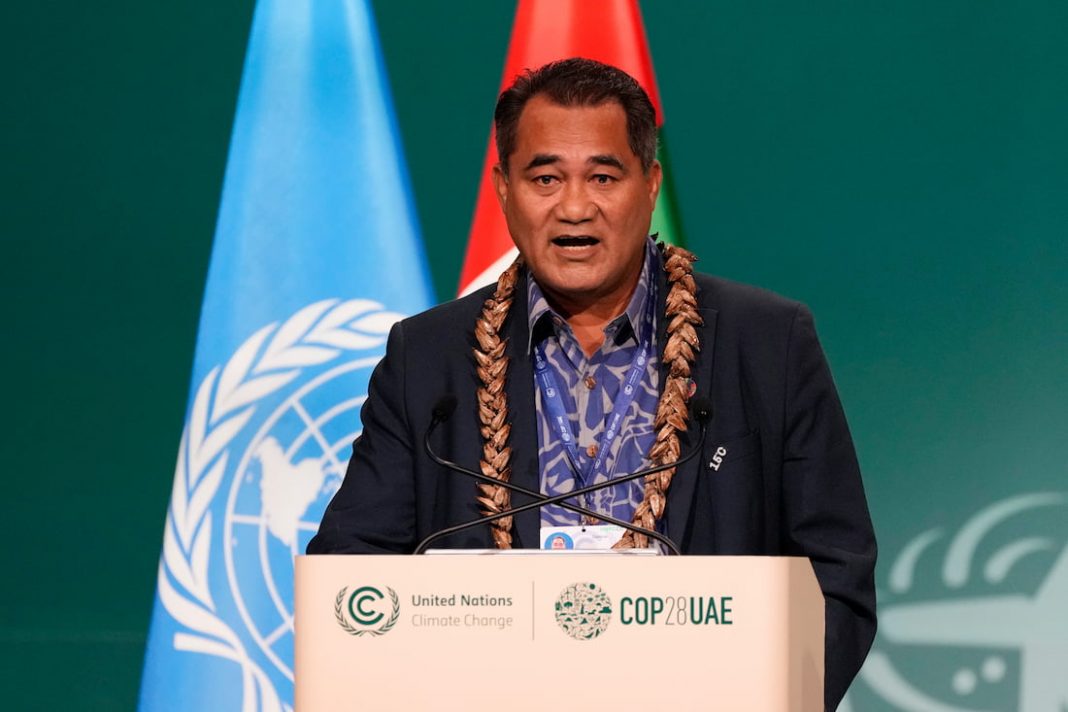Australia will not sign the “death certificates” of small island nations, after COP28 discussions produced a draft climate deal that omitted the demands of many countries for a phase-out of fossil fuels.
As the 2023 United Nations Climate Change Conference heads into its final scheduled day, delegates have traded verbal blows over the latest draft of a COP28 agreement.
Published by summit hosts the United Arab Emirates, it proposed options countries could use to cut emissions but did not refer to a “phase-out” of all fossil fuels.
Samoa’s Natural Resources and Environment Minister Toeolesulusulu Cedric Schuster rejected the deal, saying the survival of small islands was at stake and declared they would “not sign our death certificates”.
Speaking on behalf of the Umbrella group, which includes Australia, Canada, Japan, the US and Norway, Australian Climate Change Minister Chris Bowen said they would not support the draft.
“We will not be a co-signatory to those death certificates,” Mr Bowen said in Dubai overnight.
“That is what is at stake for many countries who are represented here tonight and many people who do not have a voice.
“Some of the world’s largest economies have now called for a phase-out of unabated fossil fuels, some of the world’s smallest countries have called for us to transition away from fossil fuels in an orderly and just manner.
“The rest of us should find it within ourselves to join them.”
While Mr Bowen pointed out positive aspects in the draft such as the “evidence of science” in some paragraphs, he said he needed to be honest.
The deal was “too weak” and needed substantial strengthening before any of the Umbrella nations would sign on.
Climate Council researcher Simon Bradshaw said he would like the government to push for an unconditional phase out of all fossil fuels without using terms such as “abatement” which he called “very problematic”.
“Abatement” refers to carbon capture and storage, which may sound good in principle but shows almost no prospects of capturing emissions at the scale required.
The minister has called for a phase out of “unabated” fossil fuels, which generally covers all emissions but adds a level of ambiguity.
“There’s a lot of intentional vagueness, which then provides wriggle room that can hide a whole litany of sins,” Dr Bradshaw told AAP.
“But to the Australian government’s credit, they have reacted strongly to this very weak text that came through overnight.”
The latest UN report on emissions warns the world is hurtling towards 2.5 to 2.9C of warming, far beyond the Paris climate pact’s goal of 1.5 to 2C – to shield humanity from the worst consequences of climate change
“We can’t be flexible on ambition or the 1.5 degree north star,” Mr Bowen said.
With Australia hoping to co-host COP31 with Pacific nations in 2026, the government has used this year’s summit to try to prove itself a climate leader with acting Prime Minister Richard Marles reaffirming the nation’s commitment to its neighbours.
“We are obviously very mindful of our Pacific family, they are on the frontline of climate change,” he told reporters on Tuesday.
But Dr Bradshaw said Australia would also need to draw lessons from this year’s conference.
“There’s a clear signal coming out of this that the fossil fuel era is coming to an end and that we need to recognise that and be leaving our own coal and gas in the ground and doing everything we can to accelerate clean energy,” he said.
“We have seen Dubai and COP28 crawling with fossil fuels lobbyists and it’s very clear that if we host a future round of these negotiations, we’ve got to do better and keep the polluters out and really focus on leaving fossil fuels behind.”
By Kat Wong in Canberra



